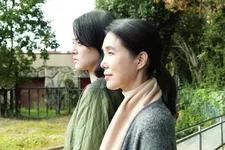 |
| A Girl Missing director Kôji Fukada seated in front of posters for James Crump’s Antonio Lopez 1970: Sex Fashion & Disco and Atsuko Hirayanagi’s Oh Lucy! at Film Movement Photo: Anne-Katrin Titze |
Kôji Fukada’s A Girl Missing (Yokogao), shot by Ken'ichi Negishi (Akihiro Toda’s Neko Ni Mikan), stars Mariko Tsutsui with Mikako Ichikawa, Miyu Ogawa, Mitsuru Fukikoshi, Sôsuke Ikematsu, and Ren Sudo. Fukada’s Harmonium won the Cannes Un Certain Regard Jury Prize in 2016 and he is also the director of The Man From The Sea and Au Revoir L’Été. At Film Movement in New York I spoke with Kôji about his love of Alfred Hitchcock’s Rear Window, how some say his heroine resembles Golden Globe winner Joaquin Phoenix’s Joker in Todd Phillips’ movie, unravelling societal conventions, and what he did to create the sound design in post-production.
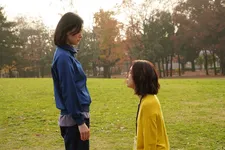 |
| Motoko (Mikako Ichikawa) with Ichiko (Mariko Tsutsui) in A Girl Missing |
A woman in a red coat enters a hair salon. She is ready for a change and happens to mention her late husband, whom she calls the "worst husband." So begins one of Kôji Fukada's intriguing timelines for us to follow. In the other, the same heroine, Ichiko, played by a fantastically versatile Mariko Tsutsui, is seen doing her job as a nurse for the Oishi family. Grandma, a famous artist, is now breathing heavily, still smoking, and riddled with dementia, she completes jigsaw puzzles of her own artworks.
Ichiko is also helping out the two daughters of the family with their school work. Older sister Motoko (Mikako Ichikawa) feels especially close to her. When the younger sister Saki (Miyu Ogawa) disappears, the missing girl of the title, everything in Ichiko's life is slowly turned upside down. What seem to be the smallest decisions of how to react, become irreversible boulders in her path.
Seated between posters of James Crump’s Antonio Lopez 1970: Sex Fashion & Disco and Atsuko Hirayanagi’s Oh Lucy!, Kôji Fukada told me that he wanted to start out confusing the audience, while at the same time dropping hints along the way.
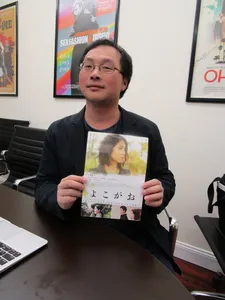 |
| Kôji Fukada: “I do love Hitchcock films. I love his colour palette, it's so vibrant. I'm very influenced by his films.” Photo: Anne-Katrin Titze |
Anne-Katrin Titze: Virginia Woolf in some of her writing gives us a hint at the timeline, where we are at, through the flowers on the table. You do it in your film with the haircuts [so does Greta Gerwig in her Little Women]. How much did hair colour and cut enter into the structuring?
Kôji Fukada: Yes, as you mentioned, there are two different timelines. It's a very strange construction. Two timelines with one woman. I wanted to explore human complexity. I wanted to confuse the audience in the first 15 minutes but I thought it would be too harsh if I had no hints whatsoever. The hairstyle is the main one but there are some other hints as well.
AKT: It's a great scene at the beginning - a woman in a red coat enters a hair salon. The whole hair change is a bit in the tradition of Hitchcock's Marnie.
KF: I do love Hitchcock films. I love his colour palette, it's so vibrant. I'm very influenced by his films.
AKT: An astonishing sequence shows your protagonist on all fours. It's a Kafka moment and we don't really know if what we are watching is reality or dream. Do you like this kind of game playing?
KF: That is kind of a turning point for Ichiko [Mariko Tsutsui], after which she unravels the societal conventions. It is a dream sequence but I wanted to make it look as real as possible.
AKT: Sound design is very important. The clicking of the heels and, especially with the grandmother, the breathing. When does the sound design come in for your work?
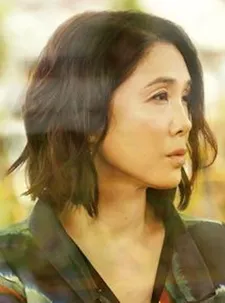 |
| Kôji Fukada on Ichiko (Mariko Tsutsui): “I wanted to explore human complexity.” |
KF: On set I was interested in capturing as much of the sound as possible. So during production we captured as much as possible. And during post-production it's less of making it sound natural and more of it just incorporating lifestyle sounds. That's why we have construction sounds at the very end.
AKT: You say you like Hitchcock - there's a bit of Rear Window, of course. You can't have a voyeur without channelling Rear Window.
KF: In regards to Rear Window, it is one of my favourite Hitchcock films and I think the action of looking out a window is in itself very cinematic. It's looking from the 2D to the 3D, it gives it depth. And just placing two windows creates two time lines at once. I think that makes it a very rich film already.
AKT: One of the themes in your film is forgiveness, isn't it? How much can we forgive?
KF: To forgive is very difficult. I think it is very important to find that even in films, to find characters that do forgive. I don't think a film should preach these ideas, whom we should forgive or not. I don't think it should be idealistic either.
We need to forgive but of course we can't. It's not easy to. And that's one of our hardships with life. Ichiko needs to live on, facing the fact that she cannot forgive and can also not kill.
AKT: Yes, revenge, that's the other side. There's a beautiful moment when Ichiko is sitting with the two girls, right before the guy brings the books and there is a kind of knob, like an extra ghostly presence of you.
KF: Thank you. I just found that on site when we were shooting and I loved how it made it look like there was a fourth person.
AKT: It's a great image because it speaks of the fact that there is always something else going on, something extra, unaccounted for. Hitchcock again, the invisible third. The scenes with the reporters at the door are some of the most terrifying. These are nightmare moments.
KF: Yes, definitely knocks and chime sounds are sounds that we have in our daily lives but with a different context, it suddenly becomes terrifying. Just as we have the concept of aliens that we can't see, that's also scary. Something that's not revealed is scary but as soon as it's revealed it becomes non-scary.
AKT: How much did you work with your main actress Mariko Tsutsui in preparation?
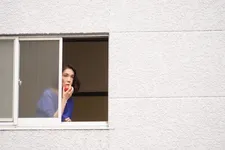 |
| Kôji Fukada on Ichiko (Mariko Tsutsui) as a voyeur: “Rear Window, it is one of my favourite Hitchcock films and I think the action of looking out a window is in itself very cinematic.” |
KF: Working with Mariko Tsutsui was green-lit before the script was written. So it was a role written for her.
AKT: Did you develop it together with her?
KF: It was totally developed with her. There are a lot of ideas from her incorporated.
AKT: The scene at the zoo is important. Camels, flamingos, the rhino's face. Two stories being told that are far-reaching. Was that a core scene you knew you had to have in the middle of the film?
KF: That's the one place where two timelines merge and the two main characters tell these very private and sexual stories. I thought it was appropriate to have an animalistic place be the place where these stories are revealed, separate from the humanist world.
AKT: Telling an anecdote that seems really of not much consequence becomes life-changing. Was the question of trust another issue you were trying to explore?
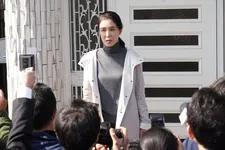 |
| Kôji Fukada on Mariko Tsutsui as Ichiko in A Girl Missing: “It was totally developed with her. There are a lot of ideas from her incorporated.” |
KF: Firstly, such seemingly innocent conversations having far-reaching consequences is a phenomenon we see on the internet nowadays. One tweet on Twitter can be the cause of bashing. That's something I feel is universal for both Japan and the US.
In regards to the theme of trust, it's something I'm always thinking about, something that is always changing between our human relationships and also driving all our relationships. One interesting thing is, in Japan this film has been released and many critics have been making a comparison between Mariko Tsutsui's character Ichiko and Joker.
AKT: Oh really?
KF: The comparison these critics are drawing is that both Mariko's character and Joker trusted society but were betrayed by it - and henceforth had gone to find revenge. They are both trying to find revenge for some non-concrete object. It's an abstract revenge and in the case of Ichiko, it's in vain. It might be said that Ichiko's journey is more cruel and she doesn't find the equivalent of a Batman, which is a concrete antagonist.
AKT: I would not have thought of the parallel. What's coming up for you?
KF: I'm currently preparing a small project about a wife and a husband.








